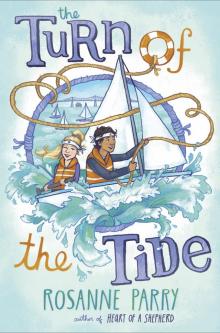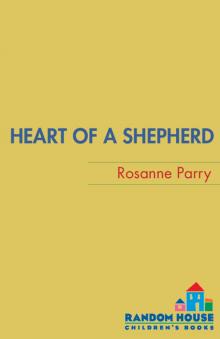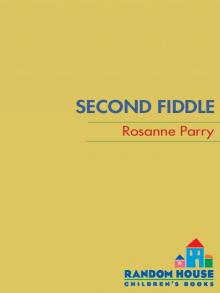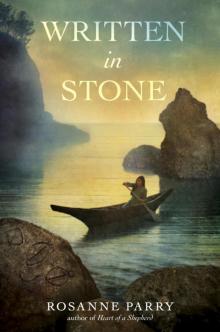- Home
- Rosanne Parry
Written in Stone Page 2
Written in Stone Read online
Page 2
“He thinks I am a helpless child with no home to live in and no future,” I said to Grandpa. And then I whispered, “But he doesn’t mean it.” Because I could see that Grandpa must challenge a man who said he is not able to care for his own grandchild, as if he were a slave and not a chief.
Uncle Jeremiah pretended to laugh. “Take our Pearl away from her grandmother? It would break the old woman’s heart.”
And then I laughed because there was nothing on my grandma that was going to break. She was solid through.
The Mustache nodded and pretended to look sad. “I loved my granny too,” he said, and he looked me over as you might a fish at the market. “She can go to the school next year. It’s not too late for her to progress. She has English, at any rate, and that’s the most important thing.”
“As you wish,” Uncle Jeremiah said, because there was nothing an agent loved so much as a humble Indian.
“But a preacher,” the Mustache went on. “You must have one for a proper burial. Who shall I send?”
When I translated, I said the word burial with extra strength because we all knew there was no body, and why would he care how we bury a body we didn’t have, and why had he come to offer condolence when he was not sad to see an Indian die.
Grandpa looked up the beach to where Charlie was waving “all clear” from the watching rock, and Henry stood ready in front of the longhouse. Today, luck was on our side, and the agent was only there to warn us. He knew we were going to chop a hole in the bottom of Papa’s whaling canoe. He knew we would lay his harpoon and whaling gear inside and raise it on posts with the prow facing west. He knew there would be a feast and guests and a giveaway. My grandfather would die of shame to not give his son an honorable memorial. But the law forbade the potlatch.
Last year, the chiefs of the Kwakiutl went to jail. They spent months locked in the pigsty at the federal prison, and all their regalia—the masks, robes of power, headdresses, and eagle down—were confiscated and carried off to a museum in Canada.
The Mustache knew we would try to potlatch. He tugged at his face hair the way an otter does. I could see him calculating the odds on how many officers he would need to arrest us all, and how he would find the giveaway or know the day we held it. Uncle Jeremiah stood shoulder to shoulder with Grandpa and stared the man down. They had tried to kill the potlatch here and in Canada for a generation. The potlatch had not died.
“See that you put him away properly,” the Mustache said.
Grandpa answered, “It will be properly done.”
They shook hands on the agreement, and then he left with his fast boat and bad smell.
Grandpa spit out that promise as soon as he was gone, and Uncle Jeremiah said, “Don’t worry, Pearl. Your father was a great man. We will honor him with a feast, and a hundred years from now people will remember his deeds. No one will go home with an empty hand.”
The next weeks were a rush of gathering. There would be hundreds of people to feed, blankets to buy, masks and drums and songs to make ready. But this time there were no goods stacked up to the roof of the house, no moving furniture to make room for piles of gifts. Instead, I watched the men slip away after dark with loaded boats and lanterns. They were gone for hours but not overnight. Instead of sending a feast messenger by canoe, they sent a postal letter, a thing that could not be questioned or searched. They bought goods from a merchant who would not talk. I didn’t need someone to spell it out for me. They were going to hold my father’s potlatch in secret on an island, probably in a cave on Tatoosh. The Indian agent would not think to look there. But when I offered to help, to hold the lantern or prepare the dance floor, Uncle Jeremiah brushed me aside. Only the men would go. Only the men would risk jail.
If I had been younger, I would have pouted, run to Grandma and complained. But this time, for once, I kept my own council and made my own plan. I just wanted something of my father’s to keep, something small from his regalia that I could always have close to me. Something like the abalone shell from my mother’s button blanket.
I put a hand to the pouch I kept at my waist under my dress. If Mama had died in childbirth, or of an accident as Papa had, they would have packed up her regalia, her button blanket and headdress, her jewelry and ceremonial things. They would have kept them in a cedar chest for me and for my daughters. But my mother died in a time of fear. The newspapers said the influenza was our fault for living too many people in one house.
“Unsanitary,” the newspaper said.
“Unnatural,” the missionary said, and he left us and never came back.
“You must burn the bodies,” the Indian agent said. “Or the disease will never leave your village.”
My father did the burning. He carried the bodies to the fire, with the baby in Mama’s arms. I could not watch. I hid in the drift logs on the beach, too sick at heart even to weep. When their bodies were gone, he built up the fire again and called me to bring their things, every toy and tool and piece of clothing. His face was smudged with soot and his eyes were strange, like the wild man mask I had seen at a potlatch the summer before.
“We can’t hold on to them,” he told me. “If we keep their things, even one little thing, a needle, a handkerchief, they will never be free, and we will never be free of them. Their death will call to us until we lose our minds and go to death with them.”
I had seen it happen. A woman burned the body of her fifth child, and then she gathered up all her children’s clothing, their shirts and small dresses, and hugged them to her body. She walked into the deep forest and did not walk out.
Papa’s hands shook as he put each of Mama’s things in the fire, the cradle and the clothes, the sewing pouch and the spindle. I tried to hold my mother’s button blanket back. I wanted it to be mine. I wanted to wrap myself in her clan symbols and feel their protection in the dark. But Papa found the chest with her ceremonial things and dragged the entire box to the fire. I couldn’t let him do it, but I couldn’t stop him either. At the last minute, when no one was looking, I grabbed Papa’s fish knife and cut one of the abalones from the border of Mama’s button blanket, a glass-smooth, palm-sized piece of shimmering purple shell.
For years, I tucked it under my cheek to help me sleep and defend me from bad dreams, and it did speak to me and call up memories of my mother. I loved that voice. And I wanted something of Papa’s, a feather from his Raven mask or a piece of the cedar fringe, to speak to me in his voice.
At the giveaway, Grandpa would take Papa’s masks and dance robes and all the songs and dances and stories that were his to tell, and he would give them away or keep them for my sons and grandsons. It was better than burning, but they are not a woman’s dances, and his regalia would never come to me. All I needed was a chance to see his masks and dance robes one last time and find some small part of it to keep.
It took almost a week to get my plan together. There was a fish canoe, a little one I could paddle by myself. I put together a disguise, not a perfect one, but I would be paddling in the dark. I went over the landmarks on the way to the island, the ones I would be able to see in the moonlight. I practiced my paddling whenever I had a spare moment. It was risky, but I had to try.
The morning before the feast, I spent the whole day with raw fish. The fog had rolled in and cut the houses from my sight. Henry was painting the new totem pole with Uncle Jeremiah. Charlie was making a drum with Grandpa and rehearsing the welcome song. Even little Ida was making baskets for the giveaway. It was just talentless me, and the dead fish.
I could hear the littlest cousins running gutted fish to the alder fire where the Quinault aunties roasted it on sticks over a long pit in the sand, red meat facing red coals. I wore Grandma’s apron and used her knife. My cut fingers burned where salt water touched them. I hated gutting fish. My mother never made me do it, not alone. I picked up a Blueback salmon as long as my arm and spoke to his silver blank eyes.
“I bet you have places you’d rather be.”
Whack.
“If I could weave like my mother—”
Slice.
“Or make a basket like every single one of my aunties—”
Scrape. Scrape.
“In fact, if I had any talent at all—”
“If you had any quelans at all, you’d treat our salmon with more respect!” Grandma stepped into my circle with a look fiercer than I had ever seen.
I jumped and dropped the knife in the gut pile. I knew what she was going to say. It fell on me like winter rain.
“They will not come back,” she said. “If you treat our salmon with disrespect, they won’t come back to our river. Every year, they have offered their lives for us, for a hundred generations.”
I sifted through the gut pile and lifted the goopy knife. I flicked a stray scrap of skin off the meat. Grandma winced, but she saw I was trying.
“It’s not healthy to work alone,” Grandma said. She took a knife from her apron pocket and lifted the cedar mat that kept the seagulls from stealing the catch. She cradled the salmon in one hand and whispered a Quinault blessing.
She made one long slice down the spine, two scrapes and a chop. Perfect. I would never get it right.
Grandma looked at me and laughed. She leaned over and gave me a little shove with her shoulder.
“Yah, yah, if you clean fish this good, we start looking for a husband.”
I picked up another fish and sliced it open even more crookedly, then turned away so she wouldn’t see me smile. There was plenty of time to get good at cleaning fish later.
3
The Giveaway
The next day was cold and clear. I stood at the door to greet the guests. Uncle Royal and his sons were out in the powerboats looking for the Indian agent. Uncle Royal was the perfect spy. He cultivated a reputation with the white fishermen. He was the Cheerful Indian. He shook hands firmly and laughed at their jokes loudly and gossiped with them about other Indians. All last week, he had bragged about the big “do” among the Quileute to the south of us. But when the Mustache went there, he would only find old McCreedy and his traveling flea market.
McCreedy was the longest-talking Indian in the world. He could talk the legs off a snake, which is why you never see one walking around. He would corner the Mustache and give him information in lavish detail about the real potlatch up across the sound with the Nootka on Vancouver Island. When the Mustache headed up north, feeling clever about the inside information he’d managed to wheedle out of that old man, McCreedy would run to the long-bearded customs agent. His boat was faster. If all went according to plan, the Beard would catch the Mustache, and they would fight, maybe even fist-fight, over taxes and jurisdiction and international border, and they would be fifty miles away from our potlatch. Uncle Royal laughed, already imagining it. He was the last guest. He hugged me off the ground as my father used to do, then closed the longhouse door.
The house was completely different set for a feast. The partitions that separated sleeping rooms from the rest of the house, and the worktables where Grandpa carved and Grandma and Aunt Loula twined their baskets, were moved out of the way. Long feast tables and benches were set for a hundred and fifty guests in two rows down the middle of the house, with extra tables around the edge. The Whale and Wolf feast dishes ran the length of the tables. Each one was as big as the bathtub in the Sears catalog. Smaller dishes were passed for guests to take their fill. We served salmon and halibut, oysters, potatoes, littleneck clams, salmonberry cake, elk steak, fry bread, blue mussels, bear sausage, canned peaches, biscuits, huckleberry jam, urchins, peas, and candy.
Grandma and Aunt Loula walked among the guests, passing out strings of olive shell, small enough to hide in a pocket. They explained to each man where to find the secret giveaway. I squeezed in next to my friends, Anita and Dorothy from Nitinat and Alert Bay. Charlie was across the table with his pack of cousins, and Henry leaned his head toward a young lady from the Queen Charlotte Islands.
Anita handed me a plate stacked tall with all my favorite foods and a full ladle of eulachon grease poured over the top. But the smell of the food and the press of so many people close together was too much for me. The last time we feasted in Grandpa’s house, my mother was alive. She sat across the table from me, and I held the baby in my lap picking out berries, biscuits, and soft potato for her tender mouth.
I tried to put them out of my mind and listen to the talk around me, but I could not swallow. I chewed and chewed, but the food would not go down. I would dishonor my father to sit at his feast table and not eat. Grandpa sat at the head of the table. He noticed everything. I prayed he would notice who was flirting with Henry or the swear Charlie learned from a logger, and not me. My mouthful of food felt bigger and bigger, and my hands started to sweat.
Aunt Loula slid in beside me on the bench. She patted my back as if I were a baby. She chatted at me about her family.
“Look at all those girls flirting with my Henry. Maybe he’ll make a match today. Charlie will sing later. He’s so talented. And look how tall my Ida’s grown. She was only a baby the last time we had a feast here.”
I hated her and her living family. She had never lost anything in her life. She couldn’t possibly understand me.
“Blue mussel?” she said to Anita. “Your favorite, right?” She scooped a bit of my food to Anita’s plate.
“This is the finest sausage we’ve made in years,” she said, helping herself to mine. She went on in praise of her own cooking and passed around my food until salmon was uncovered. She leaned in and whispered, “Salmon is familiar. It goes down.” She gave me a final pat and flapped off to crow at someone else.
Ida slid in beside me next. She bounced on the bench, making my already queasy stomach worse.
“Sisters,” she hissed through missing front teeth. “We’ll be real sisters now. Mom said you can move into my room. Girls aren’t supposed to live alone. Besides, Henry’s old enough to take a bride. Dad and Grandpa said he can live in your room, and you can share mine. You can have the top bunk if you want, and I’ll let you use my crayons.”
I didn’t hate Ida yet, but I could see it coming.
After the feast came the story. Uncle Jeremiah told it standing tall in his black-and-red robe of power in front of the carved panels of Whale and Raven. He sprinkled oil on the fire to make it burn brighter. The guests settled in silence.
“Our whale hunt began beautifully,” he said. “We saw spouts to the northwest, but as we drew near, the whales dove and disappeared. Before, when we met our brothers on the open sea, they raised up their heads to greet us. In time, one would swim alongside our canoe and offer his life for us. But this time, the whales ran from us without even a raised head in greeting.
“Had we offended them? Had we come to hunt with greed in our hearts? Disrespect in our minds? We prayed and searched, traveling farther from home.
“The morning of the second day, we found a whale alone, a singer, a humpback. He had many notches along his tail from battles with killer whales. This old one greeted us in the traditional way. His body rose beside the canoe, and we saw scars. Deep gashes ran from the blowhole down to the tail. Some scars were old, but one was so fresh it bled. They were as deep and jagged as the scars a bear leaves on the bark of a tree.
“My brother stood with his harpoon ready. As he lunged to strike, my son, Henry, shouted for him to stop, a direct challenge, a break in our silence.”
There was a stir among the listeners. The old whalers from Neah Bay and Vancouver Island leaned their heads together and spoke with sharp urgency. They had the power to cast Henry out from the society of whalers.
But the younger men and those from families that did not rank high enough to hunt whales looked at my cousin with admiration. I saw whispers pass among them and nods of satisfaction. If Uncle Jeremiah noticed the divided response, he gave no sign. He went on with the story.
“The old whale lifted his head one last time and dove. My brother saw the dive coming. He
leapt from the boat to the whale, ready to drive the harpoon deep and end our whale’s suffering. I did not see him strike.
“The whale pushed our canoe over with his tail and disappeared. We struggled to right our boat, to collect our paddles. Henry dove for his uncle in the dark water. My brother and the whale vanished, with no sound, bubble, or spout.
“We were alone on an empty sea. As we turned our canoe for home, my brother’s harpoon floated up from the depths, snapped in two pieces.
“We paddled with heavy hearts, not guessing the sorrows ahead. That evening, we saw a ship. In the distance, we thought it was a steam-powered trader. Nearer, we took it for an ironclad navy vessel with a bow-mounted cannon.
“Then the truth became clear. It was a battleship making war on the whales. The cannon held a harpoon. Dead whales were pumped full of air, chained up, and dragged along behind, only to be eaten away by sharks. Twenty whales were pouring out their blood, and still they steamed after more. The waste! The dishonor! We wanted to curse their white greed, but these sailors had faces like ours. They flew the red sun of Japan. Hours later, we passed more battleship whalers, one from America, one from Russia. We saw more dead whales in one day than this village has seen in three generations.”
Uncle Jeremiah stepped back, his tale finished. Anger rose in the room like the tide.
“Thieves!” a man shouted from one side. “The whales are ours to take.”
Grandpa’s deep voice rolled out every curse in every language he knew. “Liars! Treaty breakers! We gave them land for the sea!” he shouted. Grandpa holds the long pages of our treaty in his memory. “We gave them the trees, three hundred thousand acres of trees, theirs forever. All we asked for was the whales, and the right to hunt and fish as we always have. Now they scorn our treaty and steal the life out of the sea.”
Under the high tide of anger I heard women’s voices, quieter and more urgent, talking about hunger, disease, poverty, and shame.

 The Turn of the Tide
The Turn of the Tide Heart of a Shepherd
Heart of a Shepherd Second Fiddle
Second Fiddle Written in Stone
Written in Stone